Amazon Web Services (AWS) is the most popular cloud computing platform. It provides a comprehensive suite of services, such as computing power, storage, networking, and databases, catering to a diverse clientele comprising startups, enterprises, and government agencies.
AWS provides a range of certifications to validate and demonstrate the ability to work on its platform. If you want to enter the world of cloud computing or demonstrate an in-depth knowledge of AWS fundamentals, becoming an AWS Certified Cloud Practitioner certification holder is the ideal way to do so.
In this blog post, we will dive into the AWS Certified Cloud Practitioner certification details.
AWS Certified Cloud Practitioner Exam
The AWS Certified Cloud Practitioner (CLF-C02) exam is an entry-level certification designed to assess your understanding of the AWS cloud platform. It validates your ability to define the core AWS services, explain their use cases, and discuss the benefits of cloud computing. It serves as a foundation for more advanced AWS certifications and is recognized globally as a testament to a candidate’s understanding of cloud concepts and AWS services. This certification is ideal for anyone new to cloud computing, including:
- IT professionals considering a career in cloud computing
- Business users who want to understand how AWS can benefit their organization
- Existing IT professionals seeking foundational knowledge of AWS
Why Pursue the AWS Cloud Practitioner Certification?
Earning the AWS Cloud Practitioner certification demonstrates to potential employers that you possess the foundational knowledge required to navigate the AWS Cloud effectively.
But that’s not the only benefit - below are some of the other benefits that come with the certification:
- Career Advancement: The certification strengthens your resume and positions you for cloud-related job opportunities.
- Increased Earning Potential: Cloud professionals with certifications tend to command higher salaries.
- Enhanced Cloud Knowledge: The preparation process equips you with a solid understanding of cloud fundamentals and AWS services.
- Confidence and Credibility: Earning the certification demonstrates your commitment to learning and staying current in the cloud domain.
AWS Cloud Practitioner Certification Exam Format, Cost, Scoring
Understanding the exam structure and logistics is crucial for effective preparation. Here's what you need to know about the AWS Certified Cloud Practitioner exam:
Question format and duration
- The exam consists of 65 questions.
- You have 90 minutes to complete the exam.
- Question types include multiple choice (one correct answer out of four options) and multiple response (two or more correct answers out of five or more options).
- Unanswered questions are marked as incorrect, so it's best to attempt all questions.
Scoring
- The exam uses a pass/fail model.
- Scores are reported on a scale of 100-1000, with a minimum passing score of 720.
- The exam uses a compensatory scoring model, meaning you need to pass only the overall exam, not each section individually.
Exam delivery
- The exam is available through Pearson VUE in two formats:
- Testing center: Proctored exam at a physical Pearson VUE location.
- Online proctored: Take the exam from your home or office, supervised remotely.
Pricing
- The exam fee varies depending on your location.
- For detailed pricing information, please refer to the official AWS Certification pricing page.
Validity
The AWS Cloud Practitioner certification is valid for 3 years from the date you pass the exam.
AWS Cloud Practitioner Exam: Main Topics and Weightage
The exam is divided into four main domains, each carrying a specific weightage.
- Cloud Concepts - 24% of scored content
- Security and Compliance - 30% of scored content
- Cloud Technology and Services - 34% of scored content
- Billing, Pricing, and Support - 12% of scored content
Let's break down each domain and its key focus areas:
1. Cloud Concepts
This domain assesses your grasp of core cloud computing principles. Here's what you'll need to know:
- Cloud Service Models: Understand the distinctions between Infrastructure as a Service (IaaS), Platform as a Service (PaaS), and Software as a Service (SaaS) and their use cases within AWS.
- Deployment Models: Be familiar with public, private, and hybrid cloud deployment models and their advantages and disadvantages.
- Cloud Characteristics: Master the on-demand nature, broad network access, resource pooling, scalability, and measured service aspects of cloud computing.
2. Security and Compliance
Security is paramount in the cloud. This domain tests your understanding of:
- Shared Responsibility Model: This model defines the division of security responsibility between AWS and the customer.
- Security Best Practices: This covers core security concepts like encryption, access control, and identity management in the AWS Cloud.
- Compliance: Be familiar with how AWS helps customers meet various compliance requirements.
3. Cloud Technology and Services
This is the most significant domain, focusing on core AWS services. Here's what to expect:
- Compute Services: Understand Amazon Elastic Compute Cloud (EC2) for launching virtual machines, Amazon Lambda for serverless computing, and Amazon Elastic Container Service (ECS) for managing Docker containers.
- Storage Services: Explore Amazon Simple Storage Service (S3) for scalable object storage and Amazon Elastic Block Store (EBS) for block storage used with EC2 instances.
- Database Services: Learn about Amazon Relational Database Service (RDS) for managed relational databases and Amazon DynamoDB for high-performance NoSQL databases.
- Networking Services: Understand basic networking concepts like Virtual Private Cloud (VPC) and security groups within AWS.
- Other Services: Be familiar with other relevant services, such as Amazon CloudFront (Content Delivery Network) and Amazon Route 53 (Domain Name System).
4. Billing, Pricing, and Support
This domain assesses your knowledge of AWS billing and pricing models:
- Billing Models: Understand Pay-As-You-Go, Reserved Instances, and Spot Instances and how to choose the most cost-effective option.
- AWS Support: Be familiar with the different available AWS support options.
Whether you're just starting your tech career or looking to expand your skill set, learning about cloud computing could be a wise investment in your future. So, if you're interested in getting started, be sure to check out the Cloud Learning Path from KodeKloud.
Exam Preparation Tips and Resources
The AWS Certified Cloud Practitioner exam validates your grasp of the AWS Cloud's foundational concepts. Here are some effective tips and resources to help you prepare for it:
Review the Exam Guide: The official AWS Certified Cloud Practitioner Exam Guide outlines the exam topics and their weights. This helps you prioritize your study efforts based on the importance of each domain. You can find the latest exam guide here.
Leverage Official Resources: AWS offers many free resources to prepare for the exam. Here are some key resources:
- AWS Skill Builder: This platform provides access to courses, labs, and practice exams tailored to the AWS Cloud Practitioner exam.
- AWS Cloud Quest: Cloud Practitioner: This interactive game-based learning experience helps you learn AWS concepts in a fun and engaging way.
- AWS Whitepapers: Explore whitepapers like the "Amazon Web Services Overview" to better understand AWS services and their functionalities.
Focus on Core Services: While understanding all AWS services is valuable, prioritize the core services heavily weighted in the exam, as mentioned in the previous section (EC2, Lambda, S3, EBS, RDS, DynamoDB). This doesn't mean neglecting other frequently used services like VPC and CloudFront – a basic understanding is beneficial.
Embrace Multiple Learning Styles: Learning is most effective when it caters to different styles. Combine various resources like:
- Video Lectures: Platforms with comprehensive video lectures, such as Kodekloud that explain AWS concepts in detail.
- Hands-on Labs: The AWS Skill Builder platform and other third-party providers offer hands-on labs that allow you to gain practical experience with AWS services.
- Practice Exams: Taking practice exams helps you identify areas needing improvement, familiarize yourself with the exam format, and manage your time effectively. Utilize the free AWS Official Practice Question Sets and consider purchasing additional practice exams from reputable vendors.
Join the Community: Engaging with online communities dedicated to AWS can be immensely helpful. These communities provide a platform to:
- Connect with other exam aspirants: Share experiences, ask questions, and learn from each other.
- Seek advice from experienced professionals: Many AWS experts actively participate in online communities, offering valuable guidance.
The cloud landscape is constantly evolving. Stay updated with the latest AWS developments by subscribing to AWS blogs and following official AWS channels on social media.
Get more tips from this blog: Crack AWS Certifications Like a Pro: 7 Game-Changing Steps You Need to Know.
Beyond the AWS Cloud Practitioner Exam: Career Opportunities
Earning the AWS Certified Cloud Practitioner certification opens doors to various exciting career opportunities in cloud computing. Here are some potential career paths you can explore:
- Cloud Support Engineer: Provide technical support to users utilizing AWS services.
- Cloud Solutions Architect: Design and implement cloud-based solutions for organizations.
- DevOps Engineer: Automate infrastructure provisioning and deployment using AWS tools and services.
- Cloud Security Engineer: Ensure the security of cloud infrastructure and data in the AWS environment.
Conclusion
The AWS Certified Cloud Practitioner certification is a valuable credential that can advance your career. Use the information in this guide to prepare for the exam in a way that increases your chances of passing it. Remember, continuous learning of advanced AWS services is key for career growth within this exciting field.
Are you ready to take your first step into the vast, transformative world of cloud computing? If so, why not start with the most popular cloud service provider, AWS? We have the perfect starting point for you: a comprehensive AWS Cloud Practitioner course from KodeKloud.


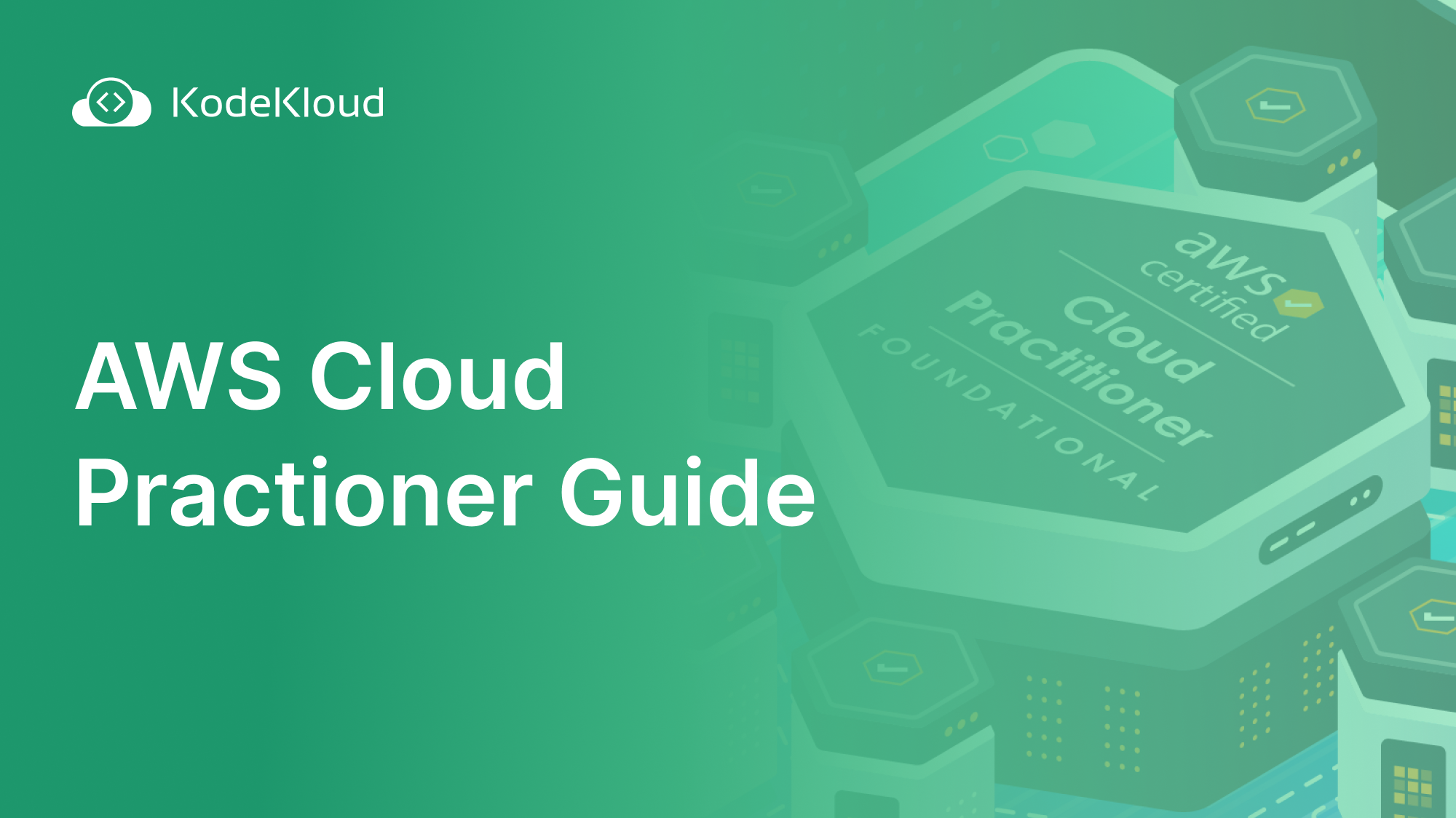
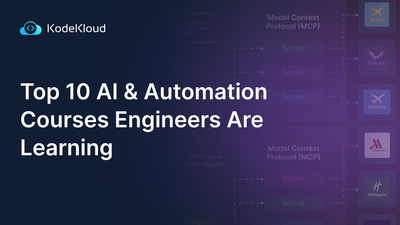

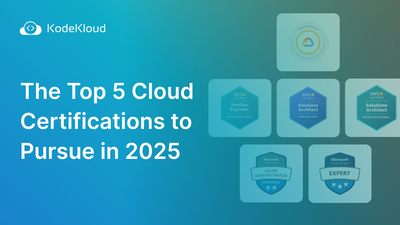
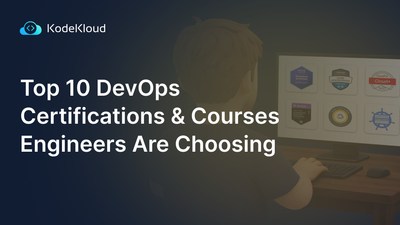

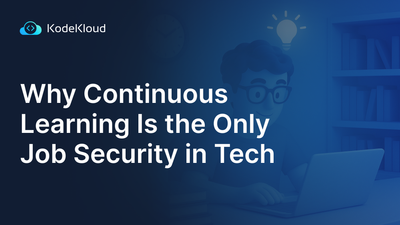
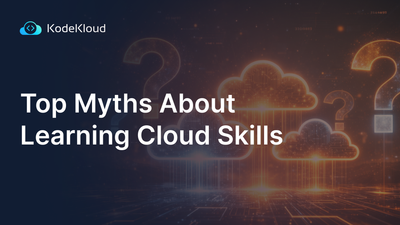
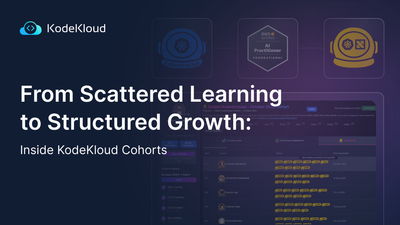
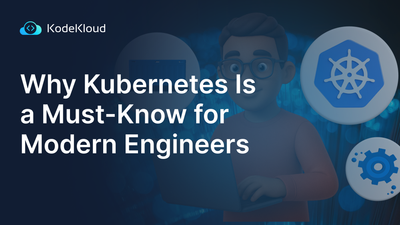

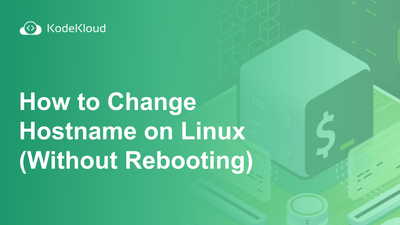

Discussion